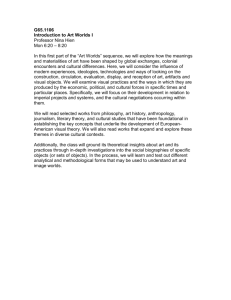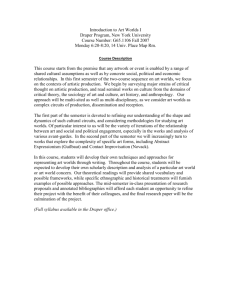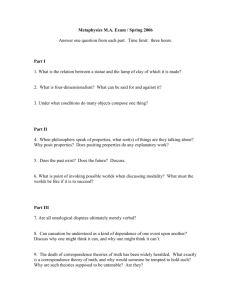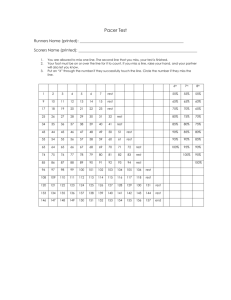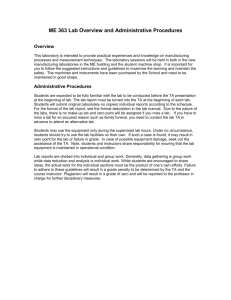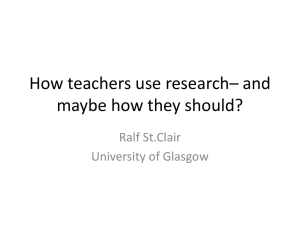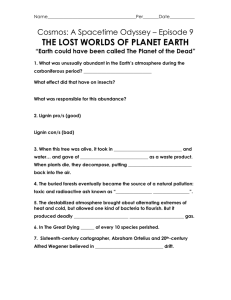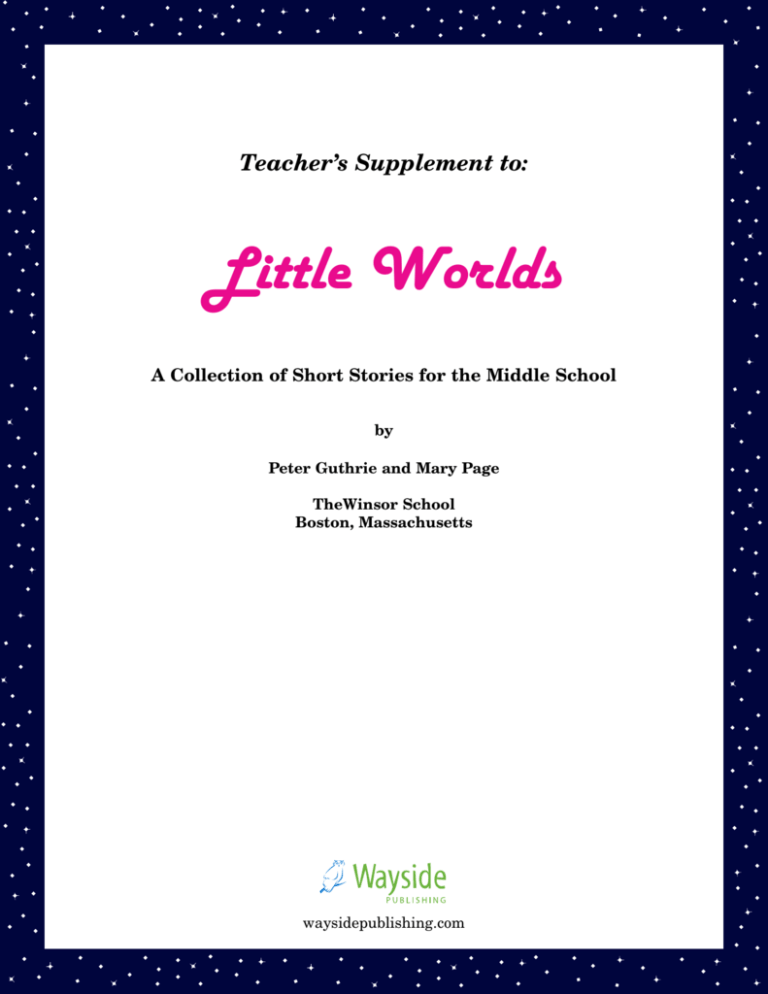
Little Worlds
Teacher’s Supplement to:
Little Worlds
A Collection of Short Stories for the Middle School
by
Peter Guthrie and Mary Page
TheWinsor School
Boston, Massachusetts
waysidepublishing.com
Copyright © 1985 by Wayside Publishing
All rights reserved. No part of this publication may be reproduced, stored in a retrieval system,
or transmitted in any form or by any means, electronic, mechanical, photocopying, recording, or
otherwise, without the prior written permission of the publisher.
ISBN 978-1-877653-94-0
Little Worlds
PART I
“The Sniper”
1.a.How many shots are fired in the story?
b.How many people are shot?
c.How is each of these people shot?
2.a.Divide the story into the beginning, the middle, and the end.
b.What is the focus of each section of the story?
3.a.This story has two climaxes. At what points do they occur?
b.Which of the climaxes is more important?
4.Describe the main conflict of the story. Is there more than one conflict?
5.a.What is the sniper like at the beginning of the story?
b.What details reveal the kind of person he is?
6.a.How does the sniper feel immediately after shooting his enemy?
b.Why does he want to know whom he has killed?
7.Why doesn’t O’Flaherty give the sniper a name?
8.What does the last line of the story mean?
9.a.Why does O’Flaherty choose to end the story where he does?
b.Given what you know about the sniper in the story, what would you predict he does after the discovery?
1
Little Worlds
“An Occurrence at Owl Creek Bridge”
1.a.What action occurs in Part I of the story?
b.Why does Bierce include so many small details in Part I?
c.At what point does Bierce choose to stop the action inPart I? Why?
2.a.What is the purpose of Part II?
b.What is the significance of the Federal scout?
3.What clues in Part III alert you that something unusual is happening?
4.a.How does Peyton Farquhar perceive the world around him at the end of Part I?
b.How does he perceive the world after he comes to the surface of the river in Part III?
c.What is Bierce’s purpose in having Farquhar perceive the world in this way?
5.a.Why does Bierce switch to the present tense in the second to last paragraph of the story?
b.What is the effect of this switch?
6.How long (in real time) do the events in Part III of the story actually take to happen?
7.a.What event in the story does the last paragraph immediately follow?
b.Why does Bierce put the longest section of the story between these two points?
8.Why do you think Bierce decided not to tell the story chronologically?
9.a.State what you think is the main conflict in the story?
b.How does Bierce’s method of organization help to emphasize this conflict?
2
Little Worlds
“The Catbird Seat”
1.a.If you only read the first two paragraphs of the story, what kind of man would you say Mr. Martin is?
b.Would this impression of him be accurate?
2.a.List some adjectives that describe Mr. Martin’s character.
b.What details in the story reveal the kind of person he really is?
3.a.Is Mr. Martin correct when he thinks that none of the murder weapons he sees would work?
b.Is he capable of killing Mrs. Barrows?
4.a.What does Mr. Martin’s sudden change in plans reveal about his character?
5.a.What is Mrs. Barrows like?
b.What details reveal her character?
6. a.Through whose eyes do we see Mrs. Barrows?
b.What words in the story show this perspective?
7 a.How would Mr. Fitweiler describe Mr. Martin?
b.How would Mr. Fitweiler describe Mrs. Barrows when he first hires her?
8.a.Why does Thurber begin the action of the story where he does?
b.How would the story be different if he organized the action chronologically?
9.a.State the main conflict of the story.
b.How does the resolution of the conflict depend on the kind of person Mr. Martin is?
3
Little Worlds
“A Visit of Charity”
1.a.How does Welty describe the Old Ladies’ Home?
b.How does this description make you feel about the home?
2.a.What is the nurse who works at the reception desk like?
b.What details does Welty use to reveal the nurse’s personality or character?
3.a.How does Welty describe the room in which the two old women live?
b.Why is this description appropriate from Marian’s point of view?
c.How does being in the room make Marian feel? Why?
4.a.To what does Welty compare the old women?
b.Why does she make these comparisons?
5.a.What are the two old women like?
b.How do they treat each other? Give examples.
c.How does Marian respond to them?
6.a.Why does Marian visit the Old Ladies’ Home?
b.What do her motives for visiting reveal about her?
c.List several adjectives or phrases that describe the kind of person Marian is.
7.a.What does the hidden red apple reveal about Marian?
b.When Adam and Eve eat the apple in the Biblical story, God punishes them by condemning them to mortality – a life ending in death. Does Marian learn anything about her mortality in the story?
c.Does Marian change as a result of her experience? Give specific evidence from the story to support your answer.
4
Little Worlds
“The Masque of the Red Death”
1.a.Where and when does the story take place? Be as specific as possible.
b.What associations does the setting have for you?
c.How does the setting contribute to the story’s mood or atmosphere?
2.List four or five adjectives which you feel describe the atmosphere of the story.
3.a.Look carefully at Poe’s word choice in the story and list several of the words he uses.
b.How does Poe’s choice of words contribute to the story’s atmosphere?
4.a.How does Poe describe the interior of the abbey?
b.How does he describe the seventh apartment in the abbey?
c.How do these descriptions make you feel?
5.a.Why does Poe make the most important action of the story take place during a masked ball?
b.What is the effect of his referring to the guests as “phantasms” and “dreams”?
6.a.What effect does the ebony clock have on the guests?
b.What effect does the clock have on the story’s atmosphere?
c.Why should a clock have this effect?
7.a.How does Poe describe the strange masquerader?
b.Who is this stranger?
c.What effect does he have on the story?
8.a.Why does Poe have the strange masquerader go into the seventh apartment at the climax of the story?
b.Why does Poe describe him as standing “within the shadow of the ebony clock”?
5
Little Worlds
“The Lottery”
1.a.What is the setting of the story?
b.What associations do you have with this setting?
2.a.What is your first impression of the story’s time period?
b.Is there any evidence in the story which indicates the time period?
3.What kind of mood or atmosphere is created by the first sentence of the story?
4.a.List three or four details that foreshadow what will happen at the end of the story.
b.How do these clues gradually change the atmosphere of the story?
5.a.What is the first sign in the story that something odd or sinister is taking place?
b.Does this sign result in any change in the story’s atmosphere and pace?
6.In “Masque of the Red Death” Poe uses the weird physical setting to emphasize the bizarre
atmosphere. How does Shirley Jackson use the physical setting in “The Lottery”?
7.a.Why is the lottery held?
b.What do the people in the story think about it?
8.a.How does Jackson first draw attention to Mrs. Hutchinson?
b.Why does she report so much of the small talk between the townspeople?
9.What point is Jackson trying to make about human nature in this story?
6
Little Worlds
“Miss Brill”
1.a.From whose point of view is the story told?
b.Is it told in the first or third person?
2.List at least three instances where Mansfield shows events through Miss Brill’s eyes.
3.a.What phrases does Mansfield use to reveal Miss Brill’s thoughts?
b.What is the effect of these phrases?
4.a.How does Mansfield describe Miss Brill’s fur at the beginning and end of the story?
b.How do these descriptions make you feel about the fur?
c.What connection does Mansfield want you to make between the fur and Miss Brill?
5.List at least four clues in the story which foreshadow the ending.
6.a.At what point in the story are we looking at Miss Brill rather than through her eyes?
b.Why is this change in point of view important to our understanding of the story?
7.a.What realization does Miss Brill come to about her role in the park?
b.Is her realization correct?
8.a.How does Miss Brill view her life?
b.What is the quality of her life really like?
c.How do you come to know what her life is like?
9.a.What sort of person is Miss Brill?
b.What details in the story reveal her character?
7
Little Worlds
“A Telephone Call”
1.a.From whose point of view is the story told?
b.Is it told in the first or third person?
2.a.Where does the action of the story take place?
b.Why is the action difficult to interpret or evaluate?
3.a.How would you describe the narrator’s state of mind?
b.What details reveal her state of mind?
4.Can you rely on what the narrator is telling you? Why or why not?
5.a.At what points in the story is the narrator deceiving herself?
b.At what points is she being honest with herself?
6.a.How does the tone in which the narrator addresses God change during the story?
b.How does the tone in which the narrator addresses the man change?
c.What connection is there between her monologue with God and her monologue with the man?
7.Can you tell much from the story about the kind of person the man is? Why or why not?
8.a.How would you describe the atmosphere of the story?
b.How does Parker’s choice of point of view contribute to this atmosphere?
9.a.Parker chose to write the story as an interior monologue (one character’s stream of thoughts). What does she accomplish by writing the story from this point of view?
b.Is the point of view Parker chose more useful as a means of revealing theme or as a means of revealing character?
c.How would the story be different if it were written in the third person? If it were written in the first person by a friend of the narrator’s?
8
Little Worlds
“The Glft of the Magi”
1.What do we learn about Jim and Della in the first five paragraphs of the story?
2.a.How does Della expect Jim to react to the cutting of her hair?
b.How does he react? Why?
3.What is Della’s reaction to Jim’s present? Why?
4.a.How does Della expect Jim to react to her gift?
b.How does he react? Why?
5.a.What is ironic about Jim’s gift to Della?
b.How does Della’s gift deepen the irony?
c.Were you able to foresee the double irony? If so, how?
6.a.Why does 0. Henry say of Della and Jim that they are the wisest of all those who give gifts and that, “They are the magi”?
b.What is ironic about this comparison?
7.a.What is the main point or idea of the story?
b.How does 0. Henry use irony to emphasize this point?
9
Little Worlds
“The Monkey’s Paw”
1.How would you describe the atmosphere of the opening paragraph of the story?
2.a.Why did the old fakir put a spell on the monkey’s paw?
b.Does the spell work?
3.a.How does the sergeant-major react when asked if he’s had his wishes?
b.Why doesn’t Jacobs tell us specifically what happened to either the sergeant-major or the first owner of the paw when they made their wishes?
4.Mr. White says: “I don’t know what to wish for, and that’s a fact. It seems to me I’ve got
all I want.” How are these words ironic?
5.a.What does Mr. White think will happen after the first wish?
b.What clues does Jacobs give that something will happen?
6.Why does Jacobs compare Mr. White’s face to the sergeant-major’s when Mr. and Mrs.
White get the news of their son’s death?
7.a.Why does Mrs. White want to use the monkey’s paw again?
b.Why is her husband hesitant?
8.What ironies does the monkey’s paw set in motion?
9.What point is Jacobs making about fate or destiny in this story?
10
Little Worlds
“Maud Martha and New York”
1.What visual associations does Maud Martha make with New York City in the first
paragraph?
2.a.On what does Maud Martha base her picture of New York?
b.Do you think her picture is valid? Why or why not?
3.a.What does New York represent or symbolize to Maud Martha?
b.List five or six qualities or ideas the city represents for her?
4.a.What kind of person is Maud Martha?
b.What details in the story reveal her character?
5.a.What does Maud Martha’s mother think about luxurious objects?
b.Do you think her mother would encourage her in her dreaming?
6.a.What positive qualities in Maud Martha does her dream about New York reveal?
b.What negative qualities in her does the dream reveal?
7.How does Brooks want us to interpret the last line?
11
Little Worlds
“The Japanese Quince”
1.a.What do you know about Mr. Nilson’s social and economic background from reading the story?
b.What details reveal his background?
2.a.How would you describe Mr. Nilson’s everyday life?
b.What evidence can you find in the story to support your description?
3.a.What does Mr. Nilson’s conversation with Mr. Tandram reveal about the kind of person he is?
b.Why does he suddenly feel foolish when he looks at his neighbor?
4.a.What kinds of words does Galsworthy use to describe Mr. Nilson’s feeling of sickness?
b.Is Mr. Nilson literally sick or is something else the matter with him?
c.If he is not literally sick, what is wrong with him?
5.a.In what ways are Mr. Nilson and Mr. Tandram similar?
b.What is significant about these similarities?
6.a.List several adjectives or phrases that Galsworthy uses to describe the Quince.
b.How does his description of the tree make you feel?
7.a.Why are Mr. Nilson and Mr. Tandram so drawn to the Japanese Quince?
b.What contrast do you notice between the tree and the men?
c.What might the tree represent or symbolize?
8.a.To what two things does the blackbird draw Mr. Nilson’s attention?
b.What might the blackbird represent or symbolize?
9.a.Why is Mr. Nilson “unaccountably upset” at the end of the story?
b.What does he do about it?
12
Little Worlds
“The Last Lesson”
1.What does Franz expect as he walks to school?
2.What signs on Franz’s trip to school indicate that it is not going to be an ordinary day?
3.a.How does M. Hamel greet Franz when he arrives at school?
b.What else is unusual in the schoolroom?
4.How would you describe the atmosphere of the first part of the story?
5.What event has happened to cause all the changes?
6.a.How does Franz feel when he hears that the Germans have ordered that French can no longer be taught in schools in Alsace?
b.Why does he feel this way?
7.How is the last lesson different from other lessons at school?
8.a.When Franz doesn’t know the answer, how does M. Hamel respond?
b.How is this behavior unlike his normal behavior?
c.What has caused this change?
d.What does M. Hamel’s behavior show about people in crisis?
9.a.What sort of impression does the last lesson make on Franz?
b.How can you tell?
10.a.What does this story tell us about how people react to the loss of things that have been taken for granted?
b.State the main idea or theme of the story in your own words.
11.To what lesson does the title of the story refer?
13
Little Worlds
“Sun and Shadow”
1.a.What does Bradbury compare the camera to in the first paragraph?
b.How does this comparison make you feel about the camera?
c.Why is the word “exploiting” important in this story?
2.a.How does the photographer see Ricardo’s house?
b.How does Ricardo see it?
3.a.Why does Ricardo object to the photographer using his son in a picture?
b.Why does Ricardo firmly state that he is not a cardboard cutout?
4.a.What does Ricardo want from the photographer?
b.What does the photographer want from Ricardo?
5.a.Why doesn’t Esteban arrest Ricardo?
b.Why does Bradbury use the policeman’s name but not the photographer’s?
6.a.For what group of people is Ricardo speaking?
7.What does Ricardo mean when he says he will be wherever the photographer goes and
that, “As long as there is one man like me in a town of ten thousand, the world will go on.
Without me, all would be chaos”?
8.Why do the people in the crowd applaud Ricardo’s words?
9.a.What does this story show about human behavior?
b.State the main idea or theme of the story in your own words.
10.What does the story’s title mean?
14
PART II
“Winter Night”
1.How is the first sentence of “Winter Night” important to the story?
2.a.What is the atmosphere of the opening paragraph?
b.What details help to create this atmosphere?
3.a.Why does Boyle refer to the housekeeper as “the voice from the kitchen”?
b.What is the housekeeper’s tone of voice when she speaks to Felicia?
c.Where does Felicia stand when she talks to the housekeeper and why?
4.a.How does Felicia envision life after the fathers come home?
b.How is this vision different from her present life?
5.a.How does Boyle describe the babysitter?
b.How is this sitter different from previous sitters?
6.a.Where did the sitter know a girl like Felicia?
b.What clues does Boyle give to show you where she was?
7.How does Felicia see the girl’s situation as similar to her own?
8.When the babysitter says, “The fathers were somewhere else in another place,” why does
Felicia answer, “Yes, I know”?
9.a.Why does the babysitter wish to brush Felicia’s hair?
b.Why was this action important to both of them?
10.What does the babysitter mean when she says, “They must all be asleep now, all of them”?
11.a.What impression do you get of Felicia’s mother from the description in the last paragraph?
b.Why should the sight of Felicia sleeping in the arms of the babysitter be “as startling as a slap across her . . . face”?
12.What does the name Felicia mean? Why is it ironic?
15
Little Worlds
“Daughter”
1.What does the first paragraph reveal about the society in the story?
2.Why doesn’t Caldwell let you know what Jim’s crime is at the beginning of the story?
3.a.Why does the sheriff reach for his gun when Jim says, “Daughter’s been hungry”?
b.Why is the sheriff worried about Jim’s getting excited?
4.a.Describe the behavior of the crowd as it stands outside the jail.
b.How does the crowd’s behavior affect the atmosphere of the story?
5.a.When does the crowd’s attitude about Jim’s crime change?
b.What does Jim say to change their attitude?
c.Why does the crowd free Jim?
6.a.How does the sheriff feel about Jim’s crime?
b.When does the sheriff’s feeling about the crime change?
c.Why does the sheriff walk away at the end?
7.a.Why does Jim keep repeating the phrase, “Daughter was hungry”?
b.What other details in the story reveal Jim’s state of mind?
8.Who is the criminal in the story?
9.What does this story reveal about human nature?
16
Little Worlds
“A Wagner Matinee”
1.a.Where is Aunt Georgiana from originally?
b.How did she end up in Nebraska?
2.a.How does Clark feel when he receives the letter from his uncle?
b.How does he feel about his Aunt?
3.Why does Aunt Georgiana say, “Don’t love it so well, Clark, or it may be taken from you”?
4.a.How does Aunt Georgiana appear physically and mentally when she arrives in Boston?
b.How does she change when she enters the concert hall?
5.Why is Aunt Georgiana so moved by the music?
6.Why does Cather compare the empty stage after the concert to “a winter cornfield”?
7.a.Why doesn’t Aunt Georgiana want to leave the concert hall?
b.What does Clark say lies just outside the hall for her?
c.What does he mean by this comparison?
8.a.When the music at the concert begins, why does Clark say, “There came to me an overwhelming sense of the waste and wear we are so powerless to combat; and I saw again the tall, naked house on the prairie, black and grim as a wooden fortress”?
b.What does Clark’s statement have to do with the main theme of the story?
17
Little Worlds
“The Story of an Hour”
1.What two important pieces of information does Chopin tell us in the first paragraph of the
story?
2.a.How does Mrs. Mallard first react to the news of her husband’s death?
b.What does this reaction suggest the main conflict of the story will be?
3.How does the scene Mrs. Mallard sees outside of her window reflect her new sense of self?
4.a.After Mrs. Mallard gets over her initial shock, what is her next reaction to her husband’s death?
b.Why would she want to use her will to beat back the oncoming recognition?
5.What kind of husband was Mr. Mallard?
6.a.Why was Mrs. Mallard dissatisfied with her marriage?
b.What in life is most important to her?
7.a.What is ironic about the last scene in the story?
b.What is ironic about the last line of the story?
18
Little Worlds
“Marigolds”
1.a.What is the main physical characteristic the narrator remembers about her hometown?
b.What feelings does she associate with this characteristic?
2.With what does the narrator associate Miss Lottie’s marigolds?
3.What specific situation in the present makes the narrator remember the marigolds?
4.a.When does the story take place?
b.What is the mood of Black people during this time?
5.What is the “something unknown and therefore terrifying” that is “beginning” for the
narrator in the story?
6.a.What is Miss Lottie’s house like?
b.What is Miss Lottie like?
c.Why do the kids like to tease her?
7.a.Why do the kids hate Miss Lottie’s marigolds?
b.What does the narrator mean by the line, “they said too much that we could not understand”?
8.The narrator says, “we children were not consciously aware of how thick were the bars of
our cage.” What cage is she talking about?
9.How does the narrator feel after she and the kids torment Miss Lottie? Why?
1 0.a.Why does the narrator destroy Miss Lottie’s marigolds?
b.Why does she cry after it is done?
1 1.a.What is the narrator’s definition of innocence?
b.Why does she feel the destruction of the marigold marks the end of her innocence?
1 2.a.What lime of year does the story take place?
b.Why do you think Collier chose this season for the story?
13.The last two lines of the story are: “For one does not have to be ignorant and poor to find
that his life is barren as the dusty yards of our town. And I too have planted marigolds.”
a.What present situation makes the narrator feel her life is “barren and dusty”?
b.Explain what you think this line means. Does she mean the last line literally or figuratively?
19
Little Worlds
“The Minister’s Black Veil”
1.a.What atmosphere does Hawthorne create in the first paragraph?
b.What is the oddity of Mr. Hooper’s appearance?
c.How does his appearance begin to change the atmosphere of the story?
2.a.How does the veil affect Mr. Hooper’s appearance?
b.How do people react to the sight of Mr. Hooper in the black veil?
3.What does the old woman mean when she says he has “changed himself into something
awful, only by hiding his face”?
4.a.How does the veil affect the parishioners during the church service?
b.How does it affect them during the funeral?
c.How does it affect them during the wedding?
5.What rumors arise as a result of the veil’s presence?
6.a.What is Mr. Hooper’s explanation for his wearing the black veil?
b.How do others interpret his wearing it?
7.a.How does the veil affect Mr. Hooper’s relationship with his parishioners? Why?
b.How does the veil affect the way the parishioners feel about Mr. Hooper? Why?
8.What does Hawthorne mean when he says the veil “kept him in that saddest of prisons, his
own heart”?
9.What does Mr. Hooper mean when he says, “There is an hour to come . . . when all of us
shall cast aside our veils”?
10.What does Mr. Hooper mean when he says, “I look around me, and, lo! on every visage a
Black Veil”?
11.What does the veil symbolize to Hooper? To his parishioners? To us?
20
Little Worlds
“Old Man at the Bridge”
1.The story is set during the Spanish Civil War, in which Franco’s Fascists fought against
those loyal to the Republican government. Describe the specific situation of the story.
2.a.What is your impression of the old man? What details reveal his character?
b.What kind of life was the old man leading before it was disrupted by war?
3.How is the old man different from the other people in the story?
4.a.What is the old man concerned about?
b.What does this concern show about the kind of person he is?
c.What is the narrator concerned about?
5.What kind of person does the narrator seem to be?
6.What is the narrator’s attitude toward the old man? How do you know?
7.a.The atmosphere of the story grows increasingly more tense. Mark the places in the story where the atmosphere changes.
b.What details does Hemingway use to heighten the suspense?
8.a.Why does the old man sit down again?
b.What realization does he make at this point?
9.What does the last line of the story mean?
21
Little Worlds
“African Morning”
1.a.Describe the main external conflict in the story.
b.Describe the main internal conflict in the story.
2.a.What is Maurai’s home life like?
b.What kind of person is his father?
3.a.How do the English treat Maurai?
b.How do the Africans treat him?
4.a.On his errands the morning of the story, what tasks does Maurai see the English doing?
b.What tasks does he see the Africans doing?
5.What does Maurai mean by the line, “Maybe that’s why the black people hate me, because I
am the color of gold”?
6.Why is Maurai afraid of nothing except “white people and black people and gold”?
7.a.Why does Maurai want to stay forever at the bottom of the lagoon?
b.What is he really wishing for at this point?
8.a.Why does Hughes focus the last paragraph of the story on the two bright jungle birds?
b.What is he trying to show in this last paragraph?
22
Little Worlds
“Through the Tunnel”
1.What can you tell (from the first paragraph) about the relationship between Jerry and his
mother?
2.a.How does Lessing describe the beach where Jerry goes?
b.How does it differ from his mother’s beach?
3.a.Why does Jerry look for his mother when he swims out to sea?
b.Why does he feel both relieved and lonely after he sees her?
4.a.What does Jerry do to claim the attention of the native boys?
b.Why does he cry when they leave?
5.After Jerry first explores the hole in the big rock, Lessing says, “He knew he must find his
way through that cave, or hole, or tunnel, and out the other side.” Why is it so important to
Jerry to do this?
6.How does the regular beach seem different to Jerry when he returns there with his mother
after being away for three days? Why?
7.a.Why does Jerry not ask permission to go to his beach the next day?
b.What does this action show about his changing relationship with his mother?
8.Why does Jerry fear not attempting to swim through the tunnel as much as he fears
attempting to do it?
9.a.How does Jerry feel in the tunnel?
b.How does Lessing increase the tension and suspense in this scene?
11.The most obvious conflict in the story is Jerry’s attempt to swim through the tunnel. Is this
the main conflict of the story?
12.What does the tunnel symbolize?
23
Little Worlds
“To Build a Fire”
1.a.How would you describe the atmosphere in the first paragraph?
b.What details does London include to help create this atmosphere?
2.a.What does it show about the man that the landscape and the weather conditions “made no
impression” on him?
b.What are his limitations?
3.a.How does London make you realize how cold it is in the story?
b.How does the man become aware of how cold it is?
4.List four or five clues that foreshadow what eventually happens in the story.
5.a.How are the man and the dog different?
b.How close are the man and the dog?
c.How does the man treat the dog?
6.a.What advice does the oldtimer at Sulphur Creek give the man?
b.How does the man respond to this advice?
c.What other mistakes does the man make in the cold?
7.a.Why does the man take such pains to build a fire?
b.What is his response when the fire fails?
8.a.How do the man’s feelings about death change?
b.Why do his feelings change?
9.What is the main conflict in this story?
1 0.a.Why does the dog survive?
b.What is the main idea about human beings London is trying to show us in this story?
24
Little Worlds
“A Summer’s Reading”
1.a.What do you learn about George’s situation from the first paragraph?
b.What clues does Malamud give about George’s personality in the first paragraph?
2.a.What are George’s dreams or goals?
b.How does George spend his time? Why?
3.Describe the neighborhood in which George lives.
4.a.What is Mr. Cattanzara like?
b.How is he different from other people in the neighborhood?
5.a.Why does George lie to Mr. Cattanzara?
b.What conflicts result from this lie?
6 a.How does George feel when Mr. Cattanzara acknowledges his lie?
b.What does Mr. Cattanzara mean when he says, “George, don’t do what I did”?
7.a.Why does George stay in his room after the incident with Mr. Cattanzara?
b.Describe what the weather is like when George is staying in his room.
c.How is the atmosphere in George’s room like his state of mind?
8.a.What does George discover Mr. Cattanzara has done when he finally comes out of his room?
b.Why do you think Mr. Cattanzara tells people George finished the books?
9.a.Why do you think George finally goes to the library?
b.Why is he trembling as he sits down to read?
25
Little Worlds
“The Necklace”
1.How does the first sentence of the story set up the conflict?
2.a.What does Madame Loisel desire?
b.Why is she so unhappy?
c.How does she cope with her situation?
3.a.How does Madame Loisel’s husband expect her to respond to the invitation?
b.How does she first respond?
c.What happens to change this first response?
4.Who has the better time at the ball, Madame Loisel or her husband? Why?
5.If you were to divide the story into three parts, where would you divide it and why?
6.Where does the climax of the story occur? Explain.
7.How does the loss of the necklace change Madame Loisel’s life?
8.a.What changes take place in Madame Loisel’s character during the story?
b.What do you think her life would have been like if she hadn’t lost the necklace?
9.a.List three different ways in which the story is ironic.
b.Why is irony so important in this story?
26
Little Worlds
“Why Reeds Are Hollow”
1.a.Why is the story divided into three parts?
b.What is the focus of each part?
2.a.What is the reeds’ motive for rebelling?
b.How are the other plants persuaded to join in the rebellion?
3.Why is the old poet critical of the rebellion?
4.a.How does the new equality affect the plants?
b.How does it affect the other creatures?
5.a.Do you think this story contains a moral or a theme? Explain.
b.State the main point of the story in your own words.
6.a.Does this story remind you of any other type of story you have read?
b.What do stories of this type have in common?
7.a.What does the hollowness of the reeds symbolize?
b.Although “Why Reeds Are Hollow” is a story about plants, Mistral is also making a point about human beings. How are the plants like people and what does their behavior show about human behavior?
27
Little Worlds
“The Crop”
1.a.What can you tell about Miss Willerton’s life from the first paragraph of the story?
b.What other details in the story illustrate the kind of life she leads? Be specific.
2.a.What, in Miss Willerton’s view, is the most difficult part of writing? Why?
b.How much does she know about the subject she finally chooses? How do you know?
3.a.Why does Miss Willerton hide the novel she bought about sharecroppers?
b.Why doesn’t she get it out of the library?
4.a.What kinds of scenes does Miss Willerton like to plan best? Why?
b.Why does she find it difficult to write these scenes?
5.Do you think Miss Willerton’s first three sentences would make a good story? Why or why
not?
6.a.What happens to Lot’s first wife in the story Miss Willerton plans?
b.Who replaces her? Why?
7.a.Why does the trip to the grocery store depress Miss Willerton?
b.Why does she decide to start a new story after she sees the couple on the way home?
8.How is Miss Willerton’s new idea for a story like and unlike her first idea?
9.What role or function does “writing stories” play in Miss Willerton’s life?
10.What is the significance of the title?
11.Compare Miss Willerton and Miss Brill. In what ways are they alike?
28
Little Worlds
“The Fig Tree”
1.From whose point of view is the story told? Explain.
2.What does Porter show about the relationship between Miranda and the adults in the first
paragraph?
3.How does Miranda feel about Cedar Grove?
4.a.What rituals or formalities does grandmother teach Miranda?
b.What kind of person is Miranda’s grandmother?
5.What kind of person is Miranda’s father?
6.How does Miranda feel about grown-ups and their world?
7.a.What does Miranda think is making the “weep, weep” noise when she first hears it, and why does the noise upset her so much?
b.Why is she unable to tell the adults around her what is upsetting her?
8.a.How is Aunt Eliza different from grandmother?
b.How do she and grandmother get along?
c.What does Miranda think of Great Aunt Eliza?
9.Why does Miranda feel “sad and strange and a little frightened” when her grandmother and
Great Aunt Eliza fight?
1 0.a.How does Miranda feel when she looks at the moon through the telescope?
b.How else does Miranda begin to see the world differently at Cedar Grove?
1 1.a.Where is Miranda when she Learns what is really making the “weep, weep” sound?
b.What might the fig tree represent or symbolize for her?
c.How are the figs at Cedar Grove different from those at home? How is this difference important in the story?
29
Little Worlds
“The Open Window”
1.Describe the situation at the beginning of the story.
2.a.What is your first impression of the niece?
b.What phrase does “Saki” use frequently to describe the niece?
3.How does Framton Nuttel’s situation leave him vulnerable to what eventually happens?
4.a.What is Nuttel’s reaction to the story the niece tells?
b.What is his reaction to the aunt when she talks about her husband and brothers?
5.a. What does Framton Nuttel’s conversation with Mrs. Sappleton reveal about his character?
b. Why do you think “Saki” chose this name for his protagonist?
6.a.Through whose eyes do we see most of the story?
b.How does this point of view affect the way we read the story?
7.a.Why does Nuttel flee the room?
b.What is ironic about Mrs. Sappleton’s interpretation of Nuttel’s flight?
8.a. What does the last sentence of the story mean?
b. How would placing the last line at the beginning change the story?
30


